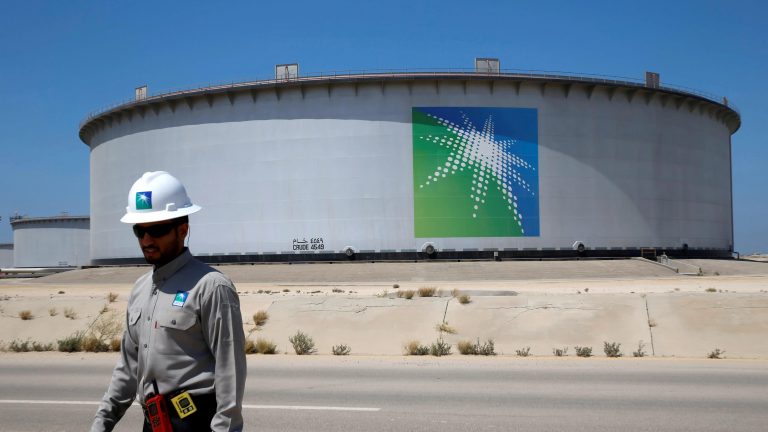Saudi Arabia’s state-owned oil giant, Aramco, was on Sunday valued at between $1.6tr and $1.71tr, 14.5% below the $2tr target set by Crown Prince Mohammed bin Salman since he first mooted an initial public offering in 2016.
Ahead of its market flotation, Aramco, the world’s most profitable company, plans to sell just 1.5% of its shares, or about three billion units, on Riyadh’s Tadawul stock exchange, a significant drop from the initial 5%, which would have made it the largest market debut of any company in the world.
About 0.5% has been earmarked for Saudi retail investors like Saudi funds, regional investors and other sovereign funds, who were promised tax cuts and a $75bn-a-year minimum dividend, which is more than five times larger than the payout by Apple, the biggest of any S&P 500 company.
The IPO size could be bigger if there is enough demand for it to utilize a 15% “greenshoe” over-allotment option.
The book-building process began on Sunday, with retail investors having till November 28 to sign up for the IPO, institutional investors can subscribe until December 4, following which the final price will be announced on December 5.
The shares would go for between 30 riyals and 32 riyals per unit, valuing the IPO at about 96bn billion riyals (or $25.6bn) through its market debut, but the final price of its shares and its valuation would be revealed early December.
The listing, expected early next month, aims to raise between $24bn and $25.6bn (£30.1bn and £33bn) from investors in the Middle East to help reform the country’s economy, after scrapping earlier plans to market it to US investors.
Aramco is also wooing investors in China and Russia, as Saudi officials visited both countries in recent weeks to underpin demand from countries that have been keen to deepen ties with the oil-rich kingdom.
The company, which supplies around 13% of the world’s oil, reported a 2019 half-year profit of $68.2bn.
Reuters quoted Zachary Cefaratti, chief executive officer of Dubai-based Dalma Capital Management Ltd, as saying his company plans “to subscribe to the IPO in two funds that we manage.”
The preliminary valuation, he added, was “in line with our expectations”.
Proceed of the IPO is to be invested in Saudi’s non-oil industries, create employment and diversify the world’s top crude exporter away from oil.
There is also the political risk of the Saudi government, which relies on Aramco for the bulk of its funding, continuing to control the company.
The Riyadh listing comes after initial hopes for a 5% IPO on the domestic and international bourses were dashed last year amid debate overvaluation and where to list Aramco.
Aramco said the IPO timetable was delayed because it began a process to acquire a 70% stake in petrochemicals maker Saudi Basic Industries Corp.
Aramco mandated 27 banks to work on the deal, including Citigroup, Goldman Sachs, HSBC, Credit Suisse, JPMorgan, Morgan Stanley, and Merrill Lynch.
Saudi Arabia’s National Commercial Bank and Riyadh-based Samba Capital have also advised on the deal.
FT of London quoted advisers as informing Saudi officials about a big gap in demand between domestic retail investors and foreign institutions, citing two persons familiar with the process.
“The issuer expressed high levels of dissatisfaction with what they were hearing,” said one of them.
Banks appointed to manage the offering have issued research with a wide valuation range of between $1.1tn and $2.5tn, underscoring the difficulties of coming up with something that would placate both investors and Saudi authorities.
Overseas institutions suggested a $1.2tn-$1.5tn valuation would be more realistic for the company, which made $111bn in net profit last year, according to bankers familiar with the process.
At the end of the offer, Saudi Aramco could have non-government shareholders for the first time in nearly 40 years by next month.
Foreign institutional interest will be limited to the roughly 1,500 qualified foreign investors already able to trade on the Saudi stock exchange or those nominated by Saudi Aramco or its advisers and approved by the market regulator.
Saudi bankers report plentiful domestic demand for the issuance, with pressure on wealthy families and institutions to apply for allocations of shares at the higher end of the valuation.
Trending Today
Menu








